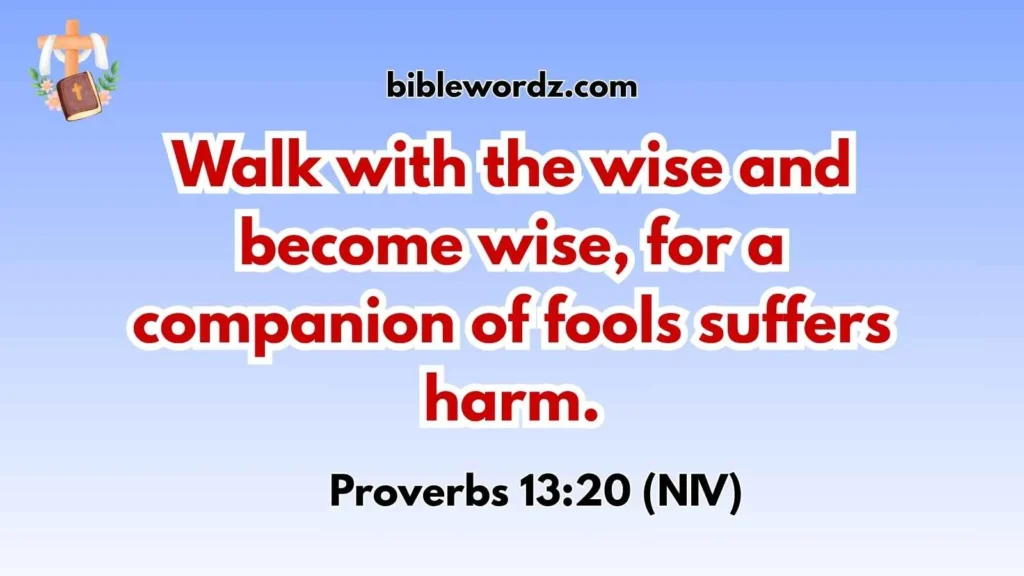Last updated on October 23rd, 2025 at 11:07 am
Family relationships can be a source of comfort, support, and love, but sometimes they can also bring pain, tension, and even toxic dynamics.
When you find yourself in a family situation that feels unhealthy or burdensome, it’s important to turn to Scripture for comfort and guidance.
The Bible offers profound wisdom on dealing with difficult family relationships, healing from emotional wounds, and seeking peace in the midst of toxicity.
In moments of struggle, God’s Word reminds us of His presence, His love, and His ability to bring restoration.
If you’re facing challenges with family members, these Bible verses can provide the strength you need to navigate these relationships, protect your peace, and trust in God’s ultimate plan for healing.
1. Matthew 10:34-36 (NIV)
“Do not suppose that I have come to bring peace to the earth. I did not come to bring peace, but a sword. For I have come to turn ‘a man against his father, a daughter against her mother, a daughter-in-law against her mother-in-law—a man’s enemies will be the members of his own household.'”
Sometimes, following Christ can lead to conflicts, even with family members. This verse highlights that Jesus understood the challenges of family divisions, especially when His truth clashes with personal relationships.
Reflection: This passage reminds us that family strife can be inevitable, especially when values differ. However, it also reassures us that God understands our struggles and stands with us when facing family discord.
2. Ephesians 6:1-4 (NIV)
“Children, obey your parents in the Lord, for this is right. ‘Honor your father and mother’—which is the first commandment with a promise—’so that it may go well with you and that you may enjoy long life on the earth.’ Fathers, do not exasperate your children; instead, bring them up in the training and instruction of the Lord.”
Healthy family dynamics are built on respect and love, both from children to parents and parents to children. This passage emphasizes that honoring one another is essential to a peaceful household. However, parents must avoid causing unnecessary frustration or harm.
Reflection: While honoring our parents is crucial, this verse also reminds parents to nurture their children with love and wisdom. Toxic family situations can arise when one side neglects their responsibilities, so seeking mutual respect and understanding is key.
3. Proverbs 15:1 (NIV)
“A gentle answer turns away wrath, but a harsh word stirs up anger.”
Toxic family dynamics often involve heated arguments and harsh words. This verse calls us to respond with gentleness, seeking peace rather than further escalating conflicts.
Reflection: In tense moments, our words matter. This verse challenges us to choose kindness and patience, fostering healing instead of contributing to the cycle of hurtful communication.
4. Colossians 3:13 (NIV)
“Bear with each other and forgive one another if any of you has a grievance against someone. Forgive as the Lord forgave you.”
Forgiveness is one of the most powerful tools for healing in toxic relationships. This verse reminds us that, just as God forgave us, we are called to extend that same forgiveness to others, even in difficult family relationships.
Reflection: Forgiveness is not always easy, especially in toxic situations. However, by forgiving others, we free ourselves from bitterness and open the door for God to heal our hearts and relationships.
5. Romans 12:18 (NIV)
“If it is possible, as far as it depends on you, live at peace with everyone.”
This verse encourages us to pursue peace in all of our relationships, including those with toxic family members. While we cannot control others’ actions, we are responsible for how we respond and whether we make the effort to live at peace.
Reflection: Living at peace with others is a choice. We may not always change the situation, but we can change how we react, trusting that God will help us navigate difficult dynamics with grace.
6. Proverbs 4:23 (NIV)
“Above all else, guard your heart, for everything you do flows from it.”
In toxic family relationships, it’s essential to protect your emotional and spiritual health. This verse teaches us the importance of guarding our hearts, especially when surrounded by negativity or hurtful behaviors.
Reflection: Guarding our hearts means setting healthy boundaries and not allowing others to damage our emotional well-being. This wisdom helps us stay grounded in God’s peace, regardless of external circumstances.
7. Matthew 5:9 (NIV)
“Blessed are the peacemakers, for they will be called children of God.”
As we navigate difficult family relationships, we are called to be peacemakers, reflecting God’s love and grace. This verse encourages us to actively seek peace, even in the midst of conflict.
Reflection: Being a peacemaker doesn’t mean avoiding confrontation, but rather handling it with wisdom and love. This posture can be transformative in toxic situations, showing others the power of God’s peace.
8. Luke 6:27-28 (NIV)
“But to you who are listening I say: Love your enemies, do good to those who hate you, bless those who curse you, pray for those who mistreat you.”
Dealing with toxic family members can feel like dealing with enemies. However, Jesus calls us to respond with love and prayer, even for those who mistreat us.
Reflection: This radical love challenges us to break the cycle of hurt and retaliation. Instead, we can choose to respond with kindness, trusting God to work in the hearts of those who hurt us.
9. 1 Corinthians 13:4-7 (NIV)
“Love is patient, love is kind. It does not envy, it does not boast, it is not proud. It does not dishonor others, it is not self-seeking, it is not easily angered, it keeps no record of wrongs. Love does not delight in evil but rejoices with the truth. It always protects, always trusts, always hopes, always perseveres.”
True love, as described in this passage, can heal even the most toxic relationships. While it’s not always easy, love rooted in God’s truth has the power to restore broken bonds.
Reflection: This is the kind of love we are called to embody in difficult relationships. It doesn’t condone harmful behavior, but it chooses to act with patience, kindness, and grace, trusting in God’s ability to heal.
10. 1 Peter 3:9 (NIV)
“Do not repay evil with evil or insult with insult. On the contrary, repay evil with blessing, because to this you were called so that you may inherit a blessing.”
In toxic family situations, retaliation may feel like a natural response. However, this verse calls us to bless those who hurt us, breaking the cycle of negativity and inviting God’s peace into our lives.
Reflection: Responding with blessing, rather than retaliation, can disarm hostility and invite healing. This is a reflection of God’s love and grace in action, even in the hardest of family circumstances.
11. 2 Timothy 3:1-5 (NIV)
“But mark this: There will be terrible times in the last days. People will be lovers of themselves, lovers of money, boastful, proud, abusive, disobedient to their parents, ungrateful, unholy, without love, unforgiving, slanderous, without self-control, brutal, not lovers of the good, treacherous, rash, conceited, lovers of pleasure rather than lovers of God.”
This passage describes traits that can be found in toxic family dynamics, where selfishness and pride create division and strife. While this can be discouraging, knowing God’s Word prepares us to navigate such times with wisdom.
Reflection: Recognizing these behaviors can help us avoid falling into toxic patterns ourselves. Instead, we are called to model the love and humility that Christ exemplified.
Bible Verse About Removing Toxic Relationships

Proverbs 13:20 (NIV)
“Walk with the wise and become wise, for a companion of fools suffers harm.”
Reflection:
This verse reminds us that the company we keep shapes our life. When relationships drain our peace or lead us away from God, stepping back becomes an act of wisdom and self-respect.
Impact:
Choosing to distance yourself from toxic people isn’t unkind — it’s spiritual maturity. God wants us to guard our hearts and grow in environments that nourish our faith and purpose.
Bible Verses About Toxic Parents
Ephesians 6:4 (NIV)
“Fathers, do not exasperate your children; instead, bring them up in the training and instruction of the Lord.”
Reflection:
Even within families, God calls for love, patience, and respect. When parental authority becomes hurtful or oppressive, this verse gently reminds both parents and children that love, not control, reflects God’s way.
Impact:
Setting healthy boundaries with toxic parents doesn’t mean disobedience — it means honoring God’s design for peace and emotional safety.
When God Separates You from Family

Luke 12:51–53 (NIV)
“Do you think I came to bring peace on earth? No, I tell you, but division.”
Reflection:
Sometimes, God allows separation not to punish us but to protect our calling. Distance can be divine when it leads us closer to His truth and away from influences that cloud our spiritual growth.
Impact:
When God removes certain people — even family — trust His purpose. Every separation carries a lesson, and sometimes healing begins in solitude with Him.
Catholic Bible Verses About Toxic Family
Psalm 27:10 (NRSVCE)
“If my father and mother forsake me, the Lord will take me up.”
Reflection:
This verse beautifully reassures Catholics that God’s love surpasses even family rejection. When earthly relationships fail, divine love remains constant and unconditional.
Impact:
No matter how painful family wounds are, God’s embrace restores identity and peace. You are never alone when your refuge is in Him.
Bible Verses About Cutting Ties with Family
2 Corinthians 6:14 (NIV)
“Do not be yoked together with unbelievers. For what do righteousness and wickedness have in common?”
Reflection:
There are times when staying connected to certain people can hinder your walk with God. This verse encourages discernment — to choose relationships that strengthen your faith, not weaken it.
Impact:
Letting go isn’t rejection; it’s redirection. Sometimes, God calls you to release ties that keep you bound so you can step fully into the life He prepared for you.
Conclusion:
Toxic family relationships can be deeply painful and challenging, but God’s Word offers guidance on how to navigate them with grace, forgiveness, and peace.
While we cannot change others, we can trust God to heal our hearts and empower us to respond in love, no matter the circumstances.
By seeking peace, guarding our hearts, and forgiving as Christ forgave us, we can experience healing and transformation in our family relationships.




